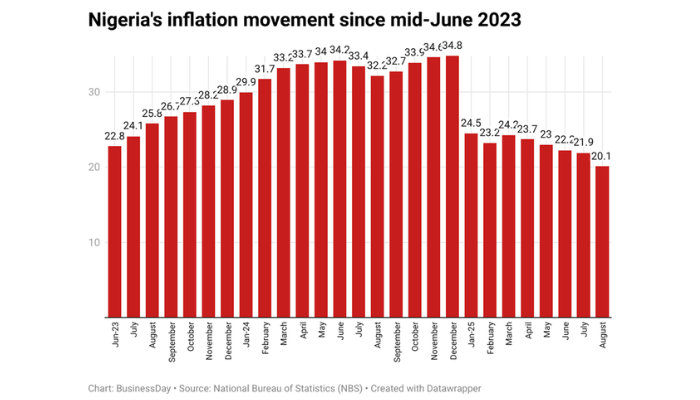Tinubuflation eases, but poverty deepens
Nigeria’s inflation story is finally changing direction. After reaching a record 34.8 per percent in December 2024, inflation has dropped steadily to 20.12 percent by August 2025, the lowest in more than two years. The turning point came after the government rebased inflation data in January 2025, giving a clearer picture of price changes under the new economic reforms.
Economists now describe this period as “Tinubuflation”, the inflation movement under President Bola Tinubu’s reform era, shaped by the removal of fuel subsidies, exchange rate unification, and tighter monetary control.
“This downward trend suggests that these reforms are beginning to work. Prices are becoming more stable, the naira is stronger, and foreign investors are returning to the local debt market for the first time in years.”
This downward trend suggests that these reforms are beginning to work. Prices are becoming more stable, the naira is stronger, and foreign investors are returning to the local debt market for the first time in years.
Read also: Nigeria’s debt rally masks inflation credibility concerns
But behind the improving numbers lies a painful reality for ordinary Nigerians. According to the World Bank, poverty levels are projected to rise to 61 percent in 2025, with about 139 million people living on less than $3 a day, up from 129 million last year. Weak growth and high inflation have sharply eroded purchasing power since 2019, reflecting both pre-2023 policy missteps and global economic shocks.
A recent study at Covenant University, titled “Effect of Fiscal and Environmental Sustainability Shocks on Macroeconomic Dynamics in Nigeria: A DSGE Perspective”, sheds light on this. The study shows that while economic shocks in Nigeria hit hard, they don’t last forever; they fade gradually as the economy adjusts.
This pattern fits what is happening now. Inflation is slowing, but poverty remains high because the effects of past shocks are still being felt. The study suggests that if government welfare programmes are well targeted and continue to support those most affected, the recovery will spread faster, and the hardship will ease with time.
In simple terms, the reforms are working, slowly but surely. Nigeria’s economy is finding balance again, though it will take months before the benefits reach everyone. The key question now is whether this early stability can turn into real relief for households, or if the pain of reform will last longer than expected.
Oluwatobi Ojabello, senior economic analyst at BusinessDay.

